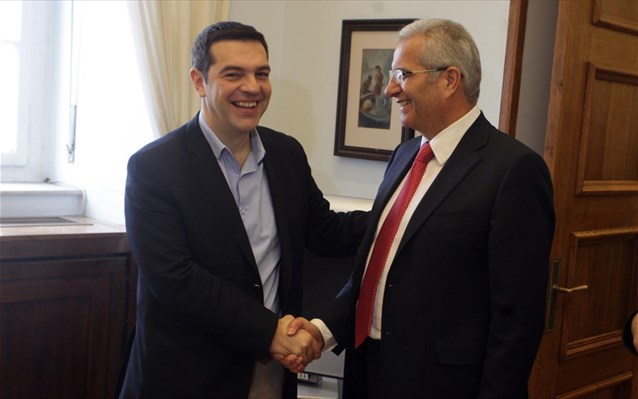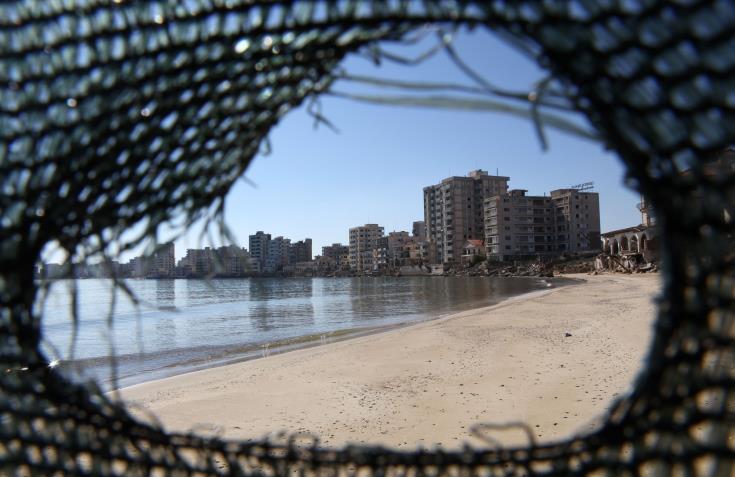
AKEL General Secretary meets with Greek Prime Minister on the Cyprus problem
Athens Press Agency, 12 October 2018
The General Secretary of the C.C. of AKEL Andros Kyprianou met today in Athens with Greek Prime Minister Alexis Tsipras.
After the meeting, the General Secretary of AKEL, in response to a question, gave his assessment that UN Secretary General Antonio Guterres, in a Report he will submit on Monday and in which he will set out his intentions, “at this stage is not going to take an initiative for a resumption of the talks on the Cyprus problem.”
Mr. Kyprianou said that “we have seen that in the coming days there will be a meeting between the leaders of the two communities, Mr. Anastasiades and Mr. Akinci”. He expressed the assessment that “the UN Secretary-General himself is waiting to see what the results of this meeting will be, so as to assess it together with everything that the UN Secretary-General’s Special Envoy on Cyprus Mrs. Lute has told him, but also on the basis of what he has heard from the contacts he himself had in New York and see how he will proceed.”
He added that Mr. Guterres “has made it clear that if certain things are not accepted with regards the substance of the Cyprus problem, but also in relation to the procedure and if he is not convinced that there will be the political will to go all the way to the end he will not resume negotiations and that is what we are very concerned about.”
The General Secretary of AKEL noted that “on his part, the Greek Prime Minister has assured us that Greece remains consistent to the positions it has always maintained. That is to say, that it is in favor of the solution of a bizonal, bicommunal federation, and of course, like us, insists on the abolition of the guarantees and intervention rights by Turkey.” He thanked the Prime Minister and the Greek people for the support they are rendering from positions of principles on the efforts to resolve the Cyprus problem.
“We have clarified,” A. Kyprianou said in his statements, “that the Cyprus problem must be solved, because if it isn’t solved, we will slide towards the final partition. All the political parties in Cyprus have decided together that the Cyprus problem can only be solved through negotiations”. “Therefore,” he added, “there is no other way, only through negotiation, not of course for the sake of negotiation, but substantive negotiations that will aim at an agreed solution.”
Asked whether “the other side accepts the Guterres framework as we mean it”, he said that “at least this is what Mr. Akinci said in April addressing Mr. Anastasiades, namely that he accepts the Guterres framework.” He said that “as time goes on, I do not hide from you that I am concerned whether Turkey’s position will be strengthened, which is insisting on other options. As long as negotiations are not resumed, these voices will be more frequent and grow stronger.”
Beginning his statements, Mr. Kyprianou said that he had a very meaningful and comprehensive meeting with the Prime Minister and thanked him “because despite his busy schedule he found time to meet us and listened to our views on the current phase, with regards developments surrounding the Cyprus problem”. “On our part, we have conveyed our positions, our concerns about how things are currently evolving in Cyprus, about the prolonged deadlock that now seems to be consolidating and about the dangers that will follow. Dangers such as the scaremongering on the part of Turkey about potential drillings in the Exclusive Economic Zone of Cyprus too; dangers such as the issue with regards the renewal of the mandate of the UN Peacekeeping Forces in Cyprus to be debated this coming January, as well as the negative developments within the Turkish Cypriot community, in the sense that things there are changing drastically. The forces there that support the solution of the Cyprus problem are continually getting weaker and declining, while on the contrary the voices that favor the solution of two separate states are growing stronger.”
Asked whether he had discussed with the Prime Minister “the thoughts and proposals that exist for a decentralized federation,” he said that “Greece does not deal with issues regarding the internal aspects, so I would not like to say anything more on this issue”.




